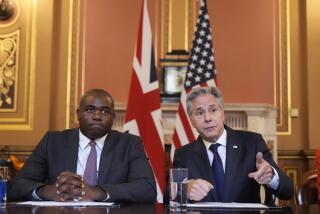Iraq’s Use of Nerve Gas Spurs U.N. to Extend Curbs
- Share via
UNITED NATIONS — The Security Council renewed the international sanctions against Iraq after hearing Wednesday of Baghdad’s ability to strike neighboring countries with missiles loaded with the swift-killing nerve gas VX and of suspicions that the Russian government tried to prevent U.N. weapons inspectors from uncovering that evidence.
Richard Butler, the U.N.’s chief weapons inspector, said tests on missile warhead fragments recovered from Iraq provided “utterly unambiguous” proof that Iraq, before the 1991 Persian Gulf War, had loaded missiles with VX, which kills a person within minutes of exposure.
Butler described the tests, conducted by the U.S. Army laboratory at Aberdeen Proving Ground in Maryland, at a closed-door meeting of the Security Council.
At the same meeting, British Ambassador John Weston confronted Russian delegates about an attempt by their government to prevent shipment of the warheads to the U.S. for testing in the spring.
Sources said a Russian representative acknowledged that Moscow had expressed concerns to U.N. inspectors about transporting the warheads but denied that it tried to prevent their inspection. He claimed that inquiries about the warheads stemmed from technical concerns and from a misunderstanding about how much material was marked for transfer to the United States.
U.N. officials who attended said the Russian explanation was met with skepticism by other council members.
The combined effect of the VX revelations and the report of the Russian intervention was to strengthen the position within the 15-member council of the United States and Britain, which strongly oppose any early relaxation of economic sanctions against Baghdad, the officials said.
Russia, supported by China and France, has been lobbying for lifting the sanctions as soon as possible. Under terms of the cease-fire that ended the Gulf War, the council cannot end the sanctions, which it reviews every 60 days and which have crippled the Iraqi economy, until Butler’s inspection team certifies that the Baghdad regime has eliminated its weapons of mass destruction, including the ability to wage chemical warfare. The sanctions stay in place unless the council votes to lift them--and such an action did not occur Wednesday.
American and British officials cited the VX evidence as contradicting long-held Iraqi assertions about the extent of its nerve gas program. At first, Baghdad denied that it had any VX. Later, it acknowledged experiments with VX but said it was never able to arm munitions with the agent, a process known in military parlance as weaponization.
“Facts are facts; Iraq has been deceiving the international community with weaponization of nerve gas. It’s that simple,” U.S. Ambassador Bill Richardson said.
The U.S. Army lab found evidence of VX in portions of warheads that were destroyed by the Iraqis just after the Gulf War. That does not prove that Iraq still has weapons loaded with the agent, but it shows that the Iraqi military has the capacity to create them.
What disarmament officials find additionally alarming is that Iraq has failed to account for all of the VX that U.N. inspectors have determined was once in Baghdad’s arsenal and has refused to provide any more information and documentation about its nerve gas program.
“I explained to the council that that is very serious because Iraq has always insisted it never weaponized VX,” Butler said.
The Iraqi mission to the U.N. issued a statement Tuesday, when the lab tests were first reported, saying the lab findings were “certainly an error.”
“The results cannot be accurate since VX was not used in any kind of munitions in Iraq due to continuous production failure,” the statement said, adding that of seven warhead samples tested, only one showed VX traces.
Iraq also asked that the tests be conducted in “a neutral country.” Butler noted that the Maryland lab is approved for chemical weapons testing by the international Chemical Weapons Convention but added that, at Iraq’s request, more tests will be conducted in France and Switzerland.
Reports of the Russian intervention, meanwhile, reinforced concerns of American and British diplomats that Moscow has become a virtual surrogate for Iraq in its dealings with the U.N.
Russian delegates acknowledged that Yuri V. Fedotov, the deputy ambassador to the U.N., questioned Butler’s office in the spring about the need to remove the missile parts to the U.S.
The intervention was rebuffed, but it raised concerns within the inspection office and among Western envoys that the Russians were trying to prevent the discovery of the incriminating traces of VX.
A spokesman for the Russian mission disputed that Wednesday, saying that Fedotov wanted only to ensure that parts of the warheads would remain in Iraq for simultaneous testing by the Iraqis.
At Wednesday’s Security Council meeting, Russian Ambassador Sergei V. Lavrov suggested that future such tests be conducted in countries other than the U.S.
In a related matter, the United States filed a formal complaint with the Security Council over a letter written to the council by Iraqi Foreign Minister Mohammed Said Sahaf. The letter described Assistant Secretary of State Martin Indyk as a “known Jew and Zionist” in complaining about Indyk’s appearance before a Washington seminar.
More to Read
Sign up for Essential California
The most important California stories and recommendations in your inbox every morning.
You may occasionally receive promotional content from the Los Angeles Times.













